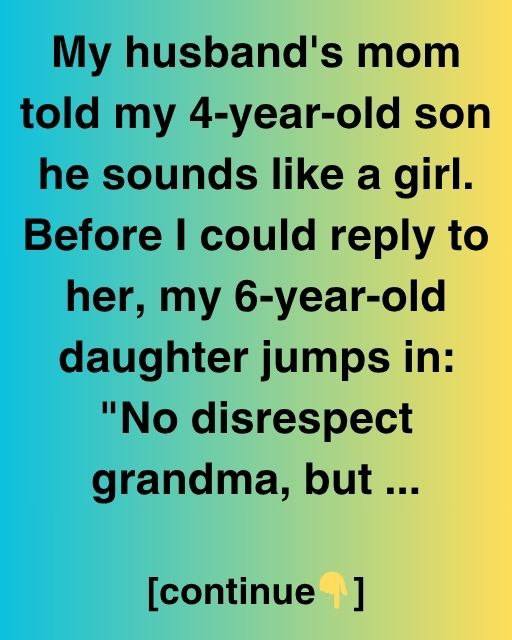My husband’s mother once said my 4-year-old son sounded “girly.”
Before I could respond, my 6-year-old daughter interrupted:
“No disrespect, Grandma, but boys can sound however they want.”
The room fell silent. It was the end of Sunday lunch, and we were still at the table. Mira—my daughter—looked at her grandmother with big brown eyes, calm but firm. Eli sat quietly, pushing vegetables around his plate.
My mother-in-law blinked, not expecting a child to challenge her. She laughed lightly.
“Oh honey, I didn’t mean anything by it. I just meant he has a nice voice.”
Mira stayed composed.
“Sweet isn’t just for girls,” she replied.
I hid a smile. My daughter has always had a strong sense of right and wrong. My husband shifted uncomfortably beside me; he hates confrontations, especially with his parents.
Trying to ease the moment, I added,
“Kids express themselves in all kinds of ways. We want them to be who they are.”
My mother-in-law nodded, though her expression said she wasn’t convinced.
The rest of lunch was quiet, except for the sound of forks and Mira telling Eli about dinosaurs.
That night, after the kids were asleep, my husband and I sat on the couch.
“You know she doesn’t mean any harm,” he said.
“I know,” I sighed. “That’s the problem—she says things without thinking. Eli’s only four. He’s sensitive. What if he starts believing something’s wrong with his voice? Or the way he plays? Or what he wears?”
He didn’t answer right away. After a long pause, he said,
“Maybe you’re right. Maybe I should talk to her.”
Over the next week, Eli became quieter.
He stopped singing his silly songs. He stopped doing his animal voices. He even stopped humming while I cooked.
Mira noticed. One night at bedtime she asked,
“Is Eli sad? He doesn’t do his voices anymore. I think Grandma hurt him.”
My heart sank. She was right—the comment had stuck.
The next morning, I sat beside him while he watched his favorite animal movie.
“Hey buddy,” I said softly. “Haven’t heard your lion voice lately. I miss it.”
He looked at me with wide eyes.
“But Grandma said I sound girly.”
I hugged him.
“She was wrong to say that. You sound like you. And that’s perfect.”
That night, I called my mother-in-law.
“I need to talk to you about Eli,” I began.
I explained how much her comment had affected him.
There was a pause. Then she said quietly,
“I didn’t realize it upset him so much.”
“He’s only four,” I replied. “At that age, every word sinks deep. I know you love him, but please understand—comments like that can make a child feel ashamed of who they are.”
After another pause, she said,
“You’re right. I was careless. I’ll come by tomorrow.”
She arrived the next day with cookies and a warm smile. Eli hesitated but stayed close to me. She knelt down and said,
“Eli, Grandma said something silly last week. Your voice is wonderful. You’re wonderful, just the way you are.”
He gave a small, shy smile.
The next day, the lion voice returned. Then the duck voice. Then the robot voice.
A few weeks later, Mira came home upset.
“Some kids said Eli can’t wear pink shoes,” she told me.
Eli had chosen glittery pink sneakers with light-up stars. He loved them because, he said, they made him run faster.
I asked Mira what she’d said to the kids.
“I told them they were being mean. But then they laughed at me too.”
I hugged her.
“You did the right thing, even when it was hard.”
That night, my husband suggested maybe Eli should wear different shoes to avoid teasing.
I shook my head. “That would teach him to change just to please others. That’s not the lesson I want him to learn.”
The next morning, Eli wore his glittery sneakers proudly.
I stayed parked near the school at recess, worried.
Sure enough, some boys laughed and pointed. My stomach tightened—until one boy stepped away from the group, talked to Eli, and then ran with him across the field.
He was wearing blue light-up sneakers.
When I picked Eli up, he grinned.
“Josh says my shoes are cool! He’s got light-up ones too!”
Sometimes one kind voice can drown out the noise.
By spring, something shifted. More kids started wearing different colors. Mira’s teacher even read a book about how diversity makes life beautiful. Some parents thanked Mira for defending her brother.
When the school talent show came, Eli announced,
“I want to do my animal voices—and dance like the animals too!”
The night of the show, he stepped onto the stage in his animal mask and sparkly shoes.
He roared like a lion, quacked like a duck, then did a chicken dance that made the whole room laugh.
The applause was loud and real. I saw my mother-in-law stand and wipe her eyes.
When it was over, he ran into my arms.
“Did I do good?”
“You amazed me,” I said.
One parent told me afterward,
“My daughter says she wants to wear whatever she wants now. Your son inspired her.”
On the way home, my husband said quietly,
“I’m glad we didn’t tell him to change his shoes.”
“Me too,” I smiled.
From the back seat, Mira said,
“See? People just need time to learn.”
She was right.
The world can be slow to catch up—but we can still be ourselves while it does.
Small, careless comments will always exist. But so will the people who speak up: kids like Mira, friends like Josh, voices that say, Let them be.
Those voices matter most.
Life lesson: Teach children courage and kindness. Encourage them to be themselves, even if the world isn’t clapping yet—because someday it will, thanks to voices like theirs.
